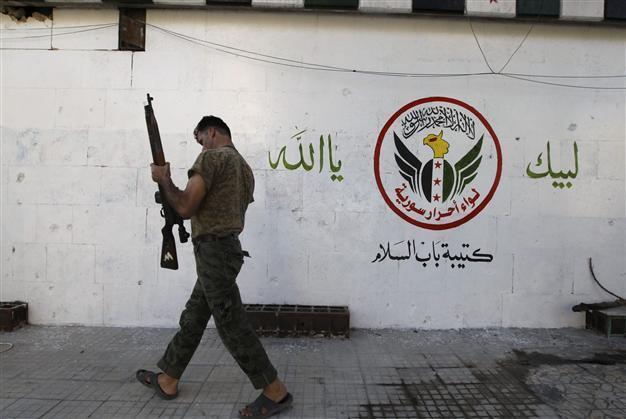Ankara denies arms shipment to Syria via Turkey
ANKARA / AMMAN

A member of the 'Liwaa Ahrar Suriya' brigade, operating under the Free Syrian Army, is seen in Sakhour area, Aleppo August 24, 2013. REUTERS photo
A senior Turkish diplomat has strictly denied a news report that cited a Syrian rebel operative as saying that 400 tons of arms have been sent into Syria from Turkey.“As has been the case with similar news reports in the past, this claim is definitely not true,” the diplomat, speaking under condition of anonymity, told the Hürriyet Daily news on Aug. 25, recalling Ankara’s earlier statements that Turkey was not involved in alleged arms deliveries to the Syrian rebels.
Earlier, opposition sources had claimed that 400 tons of arms had been sent into Syria from Turkey to boost insurgent capabilities against Syrian government forces, after a suspected chemical weapons strike on rebellious suburbs of Damascus.
The source said the Gulf-financed shipment, which crossed from the Turkish province of Hatay in the past 24 hours, was one of the single biggest shipments to reach rebel brigades since the uprising turned violent two years ago.
“20 trailers crossed from Turkey and are being distributed to arms depots for several brigades across the north,” Mohammad Salam, a rebel operative who witnessed the crossing from an undisclosed location in Hatay, told Reuters.
A senior officer in the Gulf and Western backed Supreme Military Council, an umbrella group for rebel units, confirmed the shipment, and said that weapons airlifts into Turkey have increased since rebel held Sunni Muslim neighbourhood and suburbs of Damascus were gassed last week.
Syrian opposition accounts that between 500 and well over 1,000 civilians were killed this week by gas in munitions fired by pro-government forces, and video footage of victims' bodies, have increased calls abroad for military intervention after 2 1/2 years of international inaction on Syria's conflict.
Syrian authorities sought to avert blame on Saturday by saying its soldiers had found chemical weapons in suburban Damascus tunnels used by rebels. But Western powers have cited preliminary evidence indicating that Syrian government forces were behind the chemical attack, and the United States is repositioning naval forces in the Mediterranean to give President Barack Obama the option of a military strike.
Iran's foreign minister said the Syrian government had told Tehran it would allow U.N. inspectors to visit areas reportedly affected by chemical weapons, Iran's Press TV said on Sunday.
Syria government warns any US intervention would "inflame Mideast"
Syrian authorities warned the United States against any military action over a suspected chemical weapons attack in Syria's civil war, saying this would "create a ball of fire that will inflame the Middle East".
U.S. President Barack Obama and top advisers are hashing out options for responding to the reported use of chemical weapons in Syria amid what Britain called "increasing signs" that the Syrian government was responsible for Wednesday's nerve gas attack on civilians in a rebel-dominated area.
Syrian President Bashar al-Assad's government has accused the insurgents of firing the chemical weapons "as a last resort" to try to provoke foreign intervention on their side.
Syrian Information Minister Omran Zoabi, in remarks released by the official news agency SANA late on Saturday night, said that any U.S.-led military action would be "no picnic".
"U.S. military intervention will create a very serious fallout and a ball of fire that will inflame the Middle East," Zoabi said.
He also suggested that U.N. inspectors would not be allowed to visit the site of the alleged nerve gas attack as it was not part of a previously agreed list of locations where opposition activists say government forces used chemical weapons. Syrian authorities have denied any use of poison gas in the conflict.
Zoabi said Damascus would cooperate "significantly and transparently" with U.N. investigations but not allow any "inspection that will prejudice national sovereignty".
















